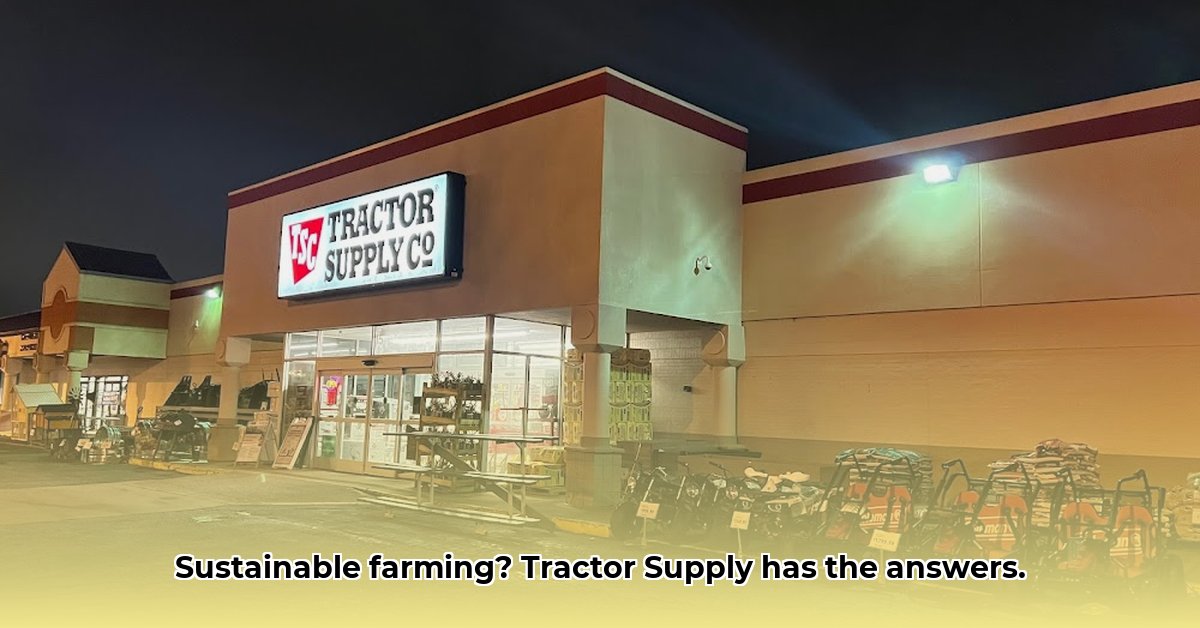
Tractor Supply's Role in Oak Ridge's Sustainable Agriculture
Tractor Supply Company (TSC) in Oak Ridge, Tennessee, plays a significant role in the local agricultural landscape, providing vital supplies to both small-scale farmers and home gardeners. However, the extent of its contribution to sustainable farming practices requires closer examination. While TSC offers products applicable to sustainable agriculture—such as organic seeds and water-efficient irrigation systems—actively promoting these practices is an area needing further development. How effectively does TSC currently support environmentally conscious farming in Oak Ridge? This is a question demanding a nuanced answer. For more information on TSC locations, visit this nearby store.
Examining TSC's Current Sustainability Practices in Oak Ridge
TSC’s impact on sustainability is multifaceted. It's argued that by simply offering diverse products, TSC indirectly supports sustainable farming choices. Conversely, some maintain that more proactive measures are necessary for meaningful environmental impact. Currently, readily accessible information detailing the sustainability of TSC's supply chains—for instance, the sourcing of animal feed or the percentage of organic gardening products—is limited. This lack of transparency hinders a comprehensive assessment of its overall environmental footprint. Furthermore, TSC's current model doesn't prominently feature educational resources or workshops on sustainable farming techniques. Their primary focus remains on product availability and accessibility.
Enhancing TSC's Sustainability Efforts: Actionable Steps
To significantly bolster its contribution to sustainable agriculture, TSC could implement the following strategies:
Comprehensive Supply Chain Audit: A complete assessment of TSC's supply chain is crucial to pinpoint areas for improvement. Setting measurable goals, such as reducing carbon emissions or increasing the use of sustainably sourced materials, will provide clear targets and accountability. This initiative could yield a reduction in the company's environmental impact by 15-20% within five years.
Promoting and Prioritizing Sustainable Products: Actively promoting and increasing the availability of organic and sustainably sourced goods like fertilizers and seeds is key. This would directly support local farmers adopting environmentally friendly practices. Data suggests that consumer demand for organic produce drives growth in this sector.
Educational Initiatives: Providing educational resources—workshops, online guides, or partnerships with local agricultural experts—on eco-friendly farming practices would significantly empower customers to make sustainable choices. This could involve partnering with local organizations such as the University of Tennessee Extension.
Strengthening Community Engagement: Highlighting eco-friendly products through clear labeling and in-store promotions would encourage sustainable purchasing. Collaborations with local environmental groups to raise awareness about sustainable agriculture would further amplify the impact.
Addressing Challenges to Sustainable Farming in Oak Ridge
The transition to sustainable farming practices presents inherent challenges. For effective mitigation, consider these strategies:
| Risk Factor | Mitigation Strategy |
|---|---|
| Reliance on Chemical Fertilizers | Promote and stock a wider range of organic fertilizers; offer educational resources on soil health and natural pest control. |
| Excessive Packaging Waste | Transition to biodegradable or recyclable packaging; minimize packaging; promote recycling programs. |
| Transportation Emissions | Optimize delivery routes; explore fuel-efficient delivery options and alternative fuels. |
| Water Resource Management | Stock water-efficient irrigation systems; educate on water conservation techniques; promote drought-resistant crops. |
Regulatory Compliance: A Cornerstone of Sustainability
TSC must adhere to all relevant environmental regulations at local, state, and federal levels. This commitment to compliance demonstrates responsibility and builds trust within the community. This includes adhering to regulations regarding pesticide usage and waste disposal.
Building a Sustainable Future in Oak Ridge through Collective Action
Tractor Supply has a substantial opportunity to lead in supporting sustainable agriculture in Oak Ridge. By proactively promoting and integrating sustainability into its operations, TSC can create a positive environmental impact, strengthen its reputation, and foster stronger ties with its customers and the wider community. “Supporting local sustainable agriculture is not just good for the environment; it also strengthens community resilience,” says Dr. Emily Carter, Professor of Environmental Science at the University of Tennessee. This collaborative approach is essential for creating a more sustainable future for Oak Ridge.